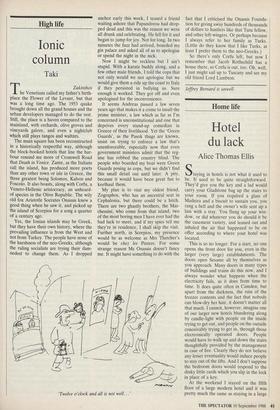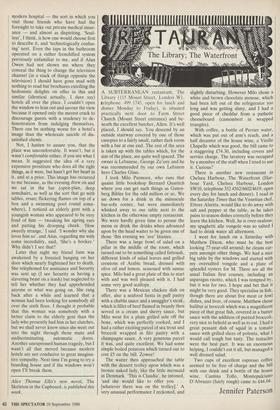Home life
Hotel du lack
Alice Thomas Ellis
Staying in hotels is not what it used to be. It used to be quite straightforward. They'd give you the key and a lad would carry your Gladstone bag up the stairs to your room. If you required a glass of Madeira and a biscuit to sustain you, you rang a bell and the owner's wife sent up a lass with a tray. You flung up your win- dow, or did whatever you do should it be the casement variety, and leaned out and inhaled the air that happened to be on offer according to where your hotel was located.
This is so no longer. For a start, no one opens the front door for you, even in the larger (very large) establishments. The doors open Sesame all by themselves as you approach. Many doors in many types of buildings and trains do this now, and I always wonder what happens when the electricity fails, as it does from time to time. It does quite often in Camden, but apart from the darkness, the ruin of the freezer contents and the fact that nobody can blow-dry her hair, it doesn't matter all that much. I cannot, however, imagine one of our larger new hotels blundering along by candle-light with people on the inside trying to get out, and people on the outside conceivably trying to get in, through those electronically operated doors. People would have to walk up and down the stairs thoughtfully provided by the management in case of fire. Clearly they do not believe any lesser eventuality would induce people to stay out of the lifts. And I don't suppose the bedroom doors would respond to the dinky little cards which you slip in the lock in place of a key.
At the weekend I stayed on the fifth floor of a large modern hotel and it was pretty much the same as staying in a large modern hospital — the sort in which you visit those friends who have had the foresight to take out private medical insur- ance — and almost as dispiriting. 'Soul- less', I think, is how one would choose first to describe it, and 'technologically confus- ing' next. Even the taps in the bathroom operated on a rather frenchified system previously unfamiliar to me, and if Alun Owen had not shown me where they conceal the thing to change the television channel (in a stack of things opposite the television) I should have gone mad with nothing to read but brochures extolling the hedonistic delights on offer in this and similar (identical actually, I dare say) hotels all over the place. I couldn't open the window to lean out and savour the view because it opened only the merest crack to discourage guests with a tendency to de- fenestration from indulging themselves. There can be nothing worse for a hotel's image than the wholesale suicide of dis- satisfied clients.
Not, I hasten to assure you, that the place was uncomfortable. It wasn't, but it wasn't comfortable either, if you see what I mean. It suggested the idea of a very expensive prostitute who does all the right things, as it were, but hasn't got her heart in it, and at a price. This image has occurred to me because, as the evening drew on and we sat in the bar (open-plan, deep armchairs, as well as the sort that go with tables, ersatz flickering flames on top of a box and a swimming pool round some- where), I noticed an elderly gent with a youngish woman who appeared to be very fond of him — tweaking his ageing ears and patting his drooping cheek. 'How sweetly strange,' I said. 'I wonder why she loves him so', and Alun, regarding me with some incredulity, said, 'She's a hooker.' Why didn't I see that?
Later that night my friend Jane was awakened by a frenzied banging on her door which nearly frightened her to death. She telephoned for assistance and Security was sent up (I see Security as having a slavering beast on a leash) but neglected to tell her whether they had apprehended anyone or what was going on. She rang back after a while and learned that a woman had been looking for somebody all over the sixth floor. I thought it probable that this woman was somebody with a better claim to the elderly gent than the lady who presently had him in her clutches, but we shall never know since she went out into the night through those mute and undiscriminating automatic doors. Another unexpressed human tragedy, but I wasn't all that moved because modern hotels are not conducive to great imagina- tive sympathy. Next time I'm going to try a boarding house and if the windows won't open I'll break them.
Alice Thomas Ellis's new novel, The Skeleton in the Cupboard, is published this week.























































 Previous page
Previous page